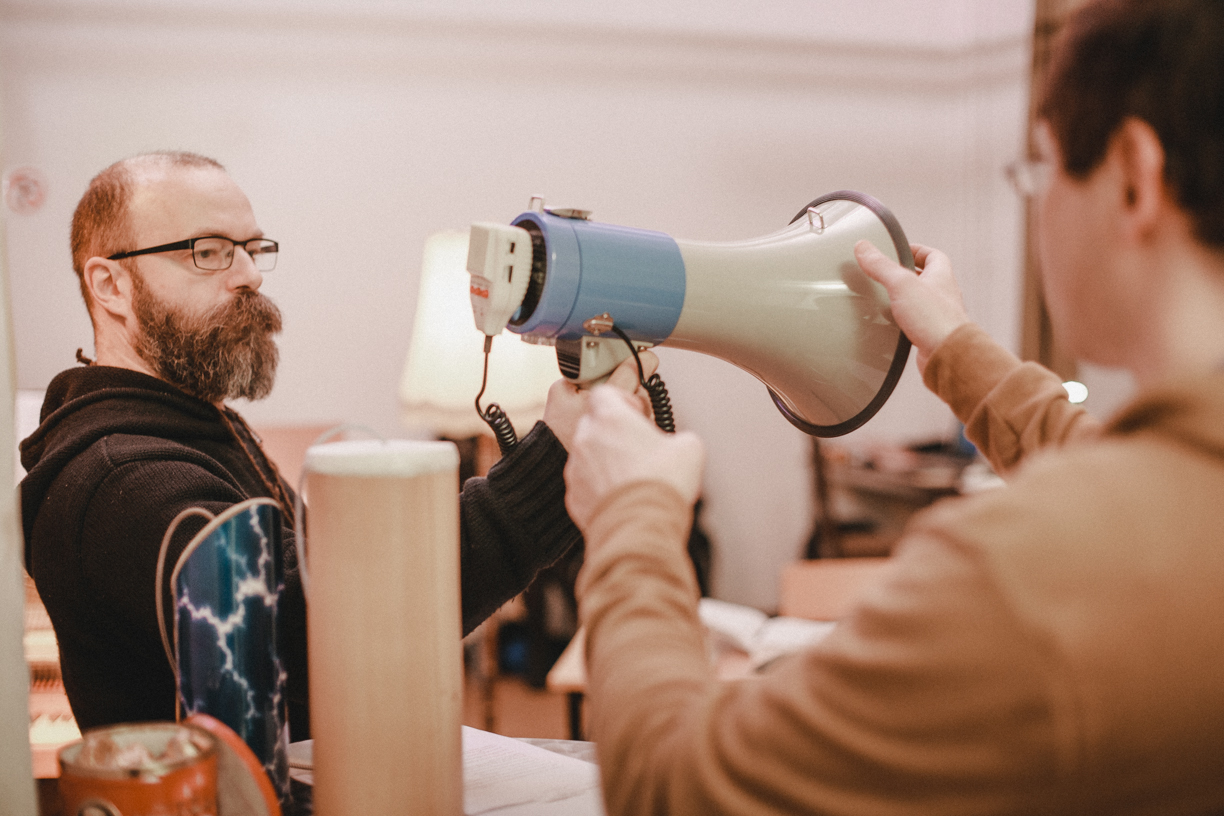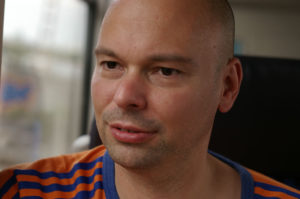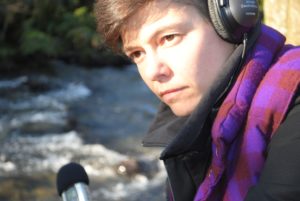Tom Bresemann was born 1978 in Berlin, where he writes, publishes, organizes events and lives.
2004 together with Philip Maroldt and Björn Schäfer he formed the S³ LiteraturWerke in Berlin, a „socially acting enterprise in service of beauty“.
2004-2009 he organized readings, symposia and publications for the S³ LiteraturWerke. (i.a. readings on the Berlin Ringbahn)
2006 together with Moritz Malsch and Katharina Deloglu he founded the Lettrétage.
2008 he organized the 1st conference of young authors DICHTES GEREDE (a collaboration between S³ LiteraturWerke, kookbooks, Texttonlabel KOOK, funded by the Berlin senate) (i.a. Hendrik Jackson, Thomas Klupp, Ron Winkler, Jan Wagner, Andrea Winkler, Kirsten Fuchs)
2009 he organized a literary walk on the „day of the dead“ for the „Latinale“.
2010 together with Timo Berger he organized the Argentinian-German writers‘ conference „Botenstoffe“, funded by the Hauptstadtkulturfonds. (i.a. Lola Arias, Laura Alcoba, Felix Bruzzone, Pablo Ramos, Tilman Rammstedt, Daniel Falb, Nora Bossong)
2011 he conceptualized and organized the speaking and reading event series „Überlandleitung“, funded by the Berlin senate. (i.a. Jean Krier, Abbas Khider, María Cecilia Barbetta)
2012 he moderated the international authors‘ conference „Schriftproben“. (with Jörg Albrecht, Gerhild Steinbuch, Kasper Colling Nielsen, Satu Taskinen, Moa Eriksson Sandberg, Haukur Már Helgason, Benedicte Meyer Kroneberg, Eiríkur Örn Norðdahl, Antje Rávic Strubel, Luise Boege amongst others)
2012 he conceptualized and organized the authors‘ conference „fernsprechende“, funded by the Berlin senate. (with Artur Becker, Dana Ranga, Daniela Seel, Konstantin Ames, Yulia Marfutova, María Cecilia Barbetta, Caudia Basrawi and Martin Lechner)
2014 he was responsible as the artistic director of the international „SOUNDOUT! Festival for New Ways of Presenting Literature“. Funded by the LOTTO Stiftung Berlin Brandenburg. Particints amongst others were Jörg Piringer, Andrea Inglese, Oleksandr Mykher, Jazra Khaleed, Eno Santanen, Robert Stadlober, Érica Zingano, Cristian Forte, Odile Kennel, Ernesto Estrella, Tomomi Adachi.
2014 he organized the PR for the Lettrétage project „¿Comment! Lesen ist schreiben ist lesen“.
2014-2017 together with Katharina Deloglu (Lettrétage) he coordinated the Network of European literary activists CROWD. Amongst others co-funded by the CREATIVE EUROPE program of the EU. CROWD organized amongst others a three month long reading bus tour from Finland to Cyprus, the participants i.a. JK Ihalainen (FI), Harri Hertell (FI), Katariina Vuorinen (FI), Olga Pek (CZ), Pambos Kouzalis (CY), Maria Siakalli (CY), Gür Genc (CY), Ilse Kilic (AT), Thomas Antonic (AT), Maria Cecilia Barbetta (DE), Artur Becker (DE), Elias Knörr (IS), Judith Keller (CH), Anja Golob (SI), Ian de Toffoli (LU), Alen Meskovic (DK), Rufus Mufasa (UK), Tsvetanka Elenkova (BG), Kätlin Kaldmaa (EE), Vladimir Durisic (ME), Birger Emanuelsen (NO), Roland Reichen (CH), Nadia Mifsud (MT), Johannes Schrettle (AT), Satu Taskinen (FI), Marko Tomaš (BA), Peter Højrup (DK), Ricardo Domeneck (DE), Fiston Mwanza Mujila (AT), Andrea Inglese (IT), Alev Adil (CY), Katarzyna Fetlińska (PL), Eino Santanen (FI), Aase Berg (SE), Ondrej Budeus (CZ), Odile Kennel (DE), Barbi Marković (RS), Markus Köhle (AT), Maxime Coton (BE), Teemu Manninen (FI), Ervina Halili (KO), Martin Jankowski (DE), Lilly Jäckl (AT), Kinga Toth (HU), John Holten (IE), Eftychia Panayiotou (CY), Jan Kaus (EE), Vakis Loizides (CY), Stefanie Sargnagel (AT), Alexander Micheuz (AT), Daniela Seel (DE), Clemens Schittko (DE), Ulrich Schlotmann (DE), Jenan Selcuk (CY), Constantinos Papageorgiou (CY), Andreas Timotheu (CY), Hannele Mikaela Taivassalo (FI), Henriikka Tavi (FI), Suvi Valli (FI), Ruzanna Voskanyan (AM),Kristina Posilovic (HR), Erinie Margariti (GR), Benediktas Janusvidius (LT), MARGENTO (RO), Mathias Traxler (CH), Steven J. Fowler (UK), Álvaro Seiça (PT), Jaap Blonk (NL), Ingamara Balode (LV), The Geminiis (FR), Avgi Lilli (CY), Angela Kaimaklioti (CY), Yiorgos Christodoulides (CY), Crauss (DE), Alexander Filyuta (DE), Jörg Piringer (AT), Christoph Szalay (AT), Florian Neuner (AT), Alexandra Salmela (FI), Paulina Haasjoki (FI), Marjo Niemi (FI), Martin Glaz Serup (DK), Alexis Stamatis (GR), Erikur Örn Norddahl (IS), Ailbhe Darcy (IE), Tone Hodnebo (NO), Josep Pedrals (ES), Mira Tuci (AL), Mikael Vogel (DE), Zeynep Köylü (TR)
2017 he conceptualized and organized the interdisciplinary digital-analogue chain poetry project „INTRE:TEXT“ amongst others with Charlotte warsen, Maren Kames, Nils Linschedt and Sabine Worthmann. Funded by the Berliner Senatsverwaltung für Kultur und Europa.




